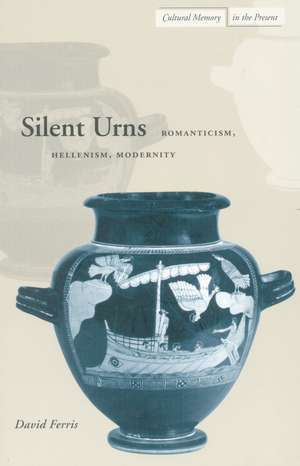Silent Urns: Romanticism, Hellenism, Modernity: Cultural Memory in the Present
Autor David Ferrisen Limba Engleză Paperback – 30 apr 2000
The study of Greece as an icon of culture appears to be as old as Greece itself, as if, like Pallas Athene springing from the head of Zeus, its cultural significance had attained full maturity at birth. In Silent Urns, the author reveals how Greece attained such significance as the result of the attempt to reconcile individuality, freedom, history, and modernity in eighteenth-century aesthetics. He argues that Winckelmann's History of Ancient Art (1764) produced this reconciliation by developing a concept of culture that effectively defined our modern understanding of the term, as well as our sense of what it is to be modern. From this reconciliation, Greece emerges as the form in which culture is first conceptualized as a historically and politically defined category.
In readings of works by Keats, Schelling, Aeschylus, Shelley, and Hölderlin, the author studies different aspects of Winckelmann's conceptualization of culture as it passes into Romantic Hellenism. Through these readings—in which individuality, identity, freedom, the tragic, and memory are all discussed—the book demonstrates how Romanticism took issue with the legacy of Greece that emerged in the eighteenth century, and did so in the name of a freedom that our cultural modernity no longer recalls.
In readings of works by Keats, Schelling, Aeschylus, Shelley, and Hölderlin, the author studies different aspects of Winckelmann's conceptualization of culture as it passes into Romantic Hellenism. Through these readings—in which individuality, identity, freedom, the tragic, and memory are all discussed—the book demonstrates how Romanticism took issue with the legacy of Greece that emerged in the eighteenth century, and did so in the name of a freedom that our cultural modernity no longer recalls.
| Toate formatele și edițiile | Preț | Express |
|---|---|---|
| Paperback (1) | 204.76 lei 3-5 săpt. | |
| Stanford University Press – 30 apr 2000 | 204.76 lei 3-5 săpt. | |
| Hardback (1) | 721.44 lei 6-8 săpt. | |
| Stanford University Press – 30 apr 2000 | 721.44 lei 6-8 săpt. |
Din seria Cultural Memory in the Present
-
 Preț: 173.10 lei
Preț: 173.10 lei -
 Preț: 197.12 lei
Preț: 197.12 lei -
 Preț: 365.56 lei
Preț: 365.56 lei -
 Preț: 193.14 lei
Preț: 193.14 lei -
 Preț: 194.26 lei
Preț: 194.26 lei -
 Preț: 155.84 lei
Preț: 155.84 lei -
 Preț: 155.89 lei
Preț: 155.89 lei -
 Preț: 149.68 lei
Preț: 149.68 lei -
 Preț: 211.98 lei
Preț: 211.98 lei -
 Preț: 228.62 lei
Preț: 228.62 lei -
 Preț: 206.94 lei
Preț: 206.94 lei -
 Preț: 209.36 lei
Preț: 209.36 lei -
 Preț: 193.58 lei
Preț: 193.58 lei -
 Preț: 156.25 lei
Preț: 156.25 lei -
 Preț: 146.22 lei
Preț: 146.22 lei -
 Preț: 171.47 lei
Preț: 171.47 lei -
 Preț: 194.45 lei
Preț: 194.45 lei -
 Preț: 229.26 lei
Preț: 229.26 lei -
 Preț: 296.64 lei
Preț: 296.64 lei -
 Preț: 210.24 lei
Preț: 210.24 lei -
 Preț: 228.62 lei
Preț: 228.62 lei -
 Preț: 278.31 lei
Preț: 278.31 lei -
 Preț: 298.62 lei
Preț: 298.62 lei -
 Preț: 153.16 lei
Preț: 153.16 lei -
 Preț: 193.58 lei
Preț: 193.58 lei -
 Preț: 228.39 lei
Preț: 228.39 lei -
 Preț: 139.64 lei
Preț: 139.64 lei -
 Preț: 243.46 lei
Preț: 243.46 lei -
 Preț: 201.90 lei
Preț: 201.90 lei -
 Preț: 152.36 lei
Preț: 152.36 lei -
 Preț: 226.40 lei
Preț: 226.40 lei -
 Preț: 169.59 lei
Preț: 169.59 lei -
 Preț: 197.12 lei
Preț: 197.12 lei -
 Preț: 194.88 lei
Preț: 194.88 lei -
 Preț: 170.65 lei
Preț: 170.65 lei -
 Preț: 194.45 lei
Preț: 194.45 lei -
 Preț: 151.12 lei
Preț: 151.12 lei -
 Preț: 194.01 lei
Preț: 194.01 lei -
 Preț: 194.45 lei
Preț: 194.45 lei -
 Preț: 208.06 lei
Preț: 208.06 lei -
 Preț: 196.69 lei
Preț: 196.69 lei -
 Preț: 142.73 lei
Preț: 142.73 lei -
 Preț: 466.14 lei
Preț: 466.14 lei -
 Preț: 167.15 lei
Preț: 167.15 lei -
 Preț: 194.45 lei
Preț: 194.45 lei -
 Preț: 173.51 lei
Preț: 173.51 lei -
 Preț: 232.11 lei
Preț: 232.11 lei -
 Preț: 207.13 lei
Preț: 207.13 lei -
 Preț: 150.09 lei
Preț: 150.09 lei
Preț: 204.76 lei
Nou
Puncte Express: 307
Preț estimativ în valută:
39.18€ • 41.20$ • 32.37£
39.18€ • 41.20$ • 32.37£
Carte disponibilă
Livrare economică 27 martie-10 aprilie
Preluare comenzi: 021 569.72.76
Specificații
ISBN-13: 9780804738484
ISBN-10: 0804738483
Pagini: 272
Dimensiuni: 140 x 216 x 15 mm
Greutate: 0.33 kg
Ediția:1
Editura: Stanford University Press
Colecția Stanford University Press
Seria Cultural Memory in the Present
ISBN-10: 0804738483
Pagini: 272
Dimensiuni: 140 x 216 x 15 mm
Greutate: 0.33 kg
Ediția:1
Editura: Stanford University Press
Colecția Stanford University Press
Seria Cultural Memory in the Present
Recenzii
"This is a truly remarkable volume, remarkable for its originality, for the driving coherence of its complex subject matter, for its bringing together a number of fields of study in a manner that forces us into new realizations about their interrelationships. This book is—there is no way to overemphasize this—an exceedingly important meditation not only on Romanticism, eighteenth-century studies, and the ways we interpret art, history, and Hellenism; it is beyond all that a superb and daring commentary on cultural studies and historicism in their relationship to theories of criticism and language." —Carol Jacobs,State University of New York, Buffalo
Notă biografică
David Ferris is Associate Professor of Comparative Literature at the Graduate Center, City University of New York. He is the author of Theory and the Evasion of History and the editor of Walter Benjamin: Theoretical Essays (Stanford, 1996).
Textul de pe ultima copertă
“This is a truly remarkable volume, remarkable for its originality, for the driving coherence of its complex subject matter, for its bringing together a number of fields of study in a manner that forces us into new realizations about their interrelationships. This book is—there is no way to overemphasize this—an exceedingly important meditation not only on Romanticism, eighteenth-century studies, and the ways we interpret art, history, and Hellenism; it is beyond all that a superb and daring commentary on cultural studies and historicism in their relationship to theories of criticism and language.” —Carol Jacobs,State University of New York, Buffalo
Descriere
The study of Greece as an icon of culture appears to be as old as Greece itself, as if its cultural significance had attained full maturity at birth. In Silent Urns, the author reveals how Greece attained such significance as the result of the attempt to reconcile individuality, freedom, history, and modernity in 18th-century aesthetics.














